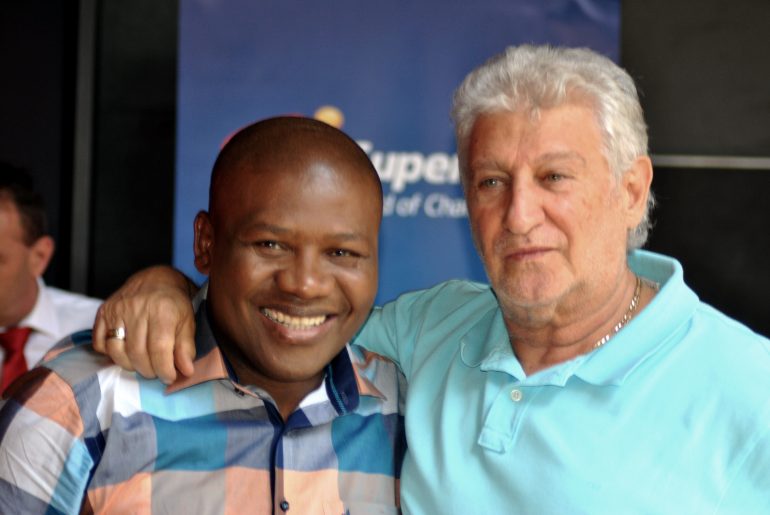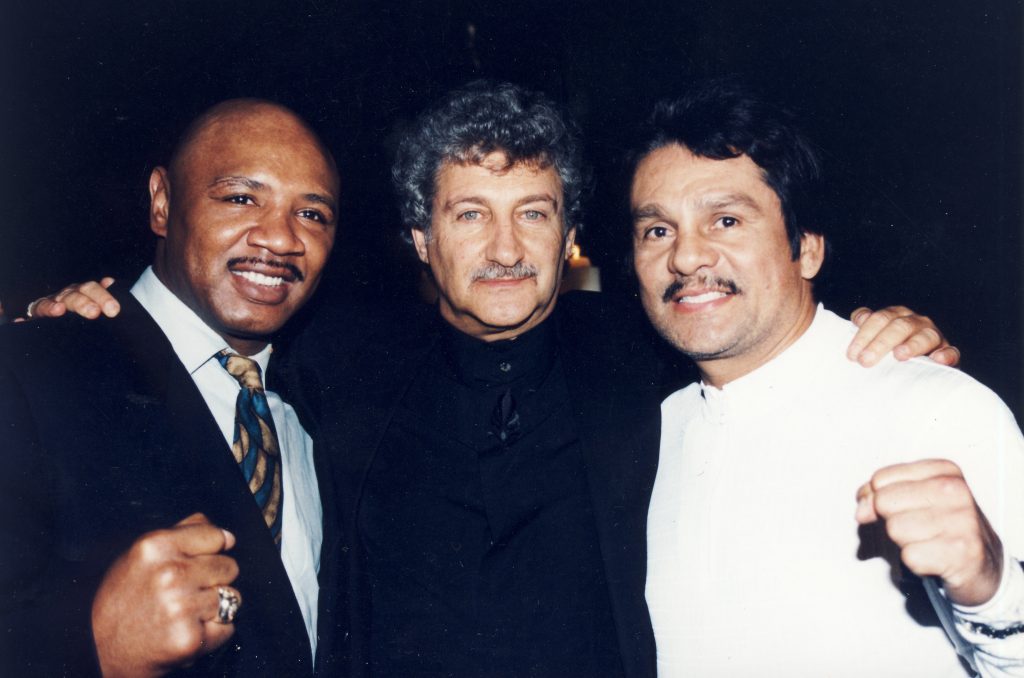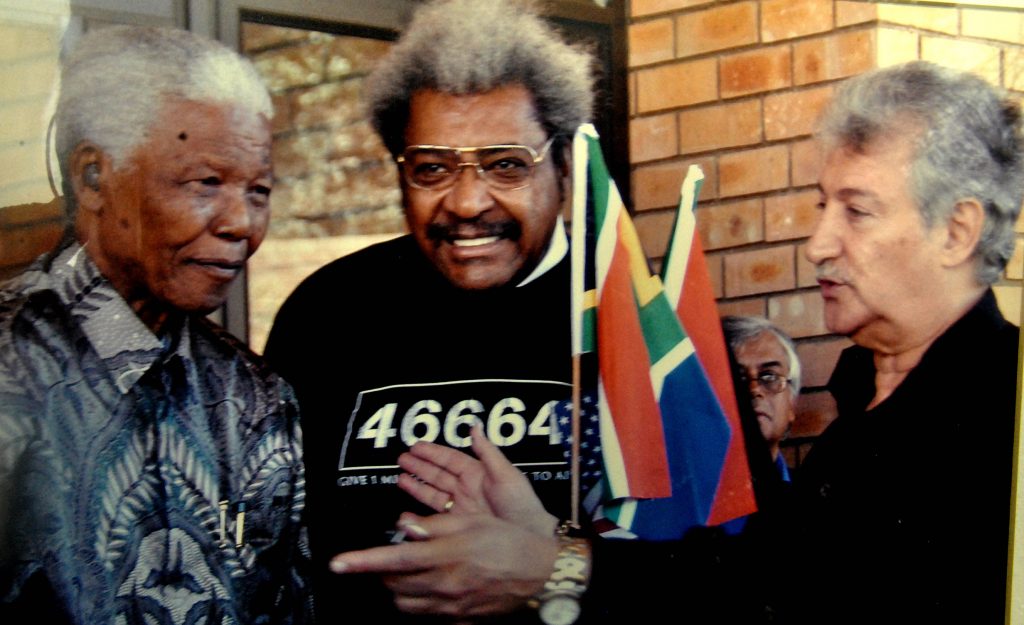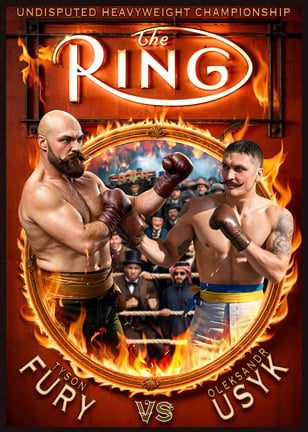Veteran South African promoter Rodney Berman is still going strong

Rodney Berman isn’t an imposing man in the physical sense but sitting ringside at Emperor’s Palace in South Africa at one of his recent cards, he does have that “Big Man” aura about him. Berman knows everyone and everyone knows him. He has that easy-going confidence of someone who has been there and done it, which is hardly surprising when you consider his track record.
Since promoting his first card back in 1977, with the headliner featuring the wildly popular junior middleweight Charlie Weir against Bushy Bester, both of whom would go on to challenge for the WBA title, he has been a mainstay on the South African scene, quickly rising to become the most prominent promoter on the African continent. Over the years, many world class fighters in South Africa have been promoted by Berman’s Golden Gloves Promotions.
Talking to him before the start of the evening’s first bell, you get the impression that he is not his own favorite subject as he keeps steering the conversation back to the fighters he promotes. Eventually, however, I manage to get him to agree to an interview the following day. Someone who has been around boxing for as long as he has should make for an interesting subject and Berman did not disappoint.
His first memories of the sport come from childhood. “The boxing board’s doctor had his surgery right on top of my dad’s office, so I would always see the visiting fighters get dropped off in a big Mercedes for their medical checkups. I was just in awe of them.” Did he ever box? He asks me whether I am familiar with the concept of a “Jewish mother.” I tell him that I have a good idea. “Well then you’ll know.” He answers. “I have her to thank for keeping me away from that. Back in those days they had boxing at the schools. It was compulsory for the young boys to have a go. They put me in the ring and the other kid beat the daylights out of me. Then my mom got wind of it and went to see the principal.” Predictably, Mrs Berman told him in no uncertain terms that there would be hell to pay if young Rodney ever set foot in a boxing ring again and that was the end of any aspirations he may have harbored as a fighter.
Boxing would come across his path again years later. Practicing as a lawyer in Johannesburg, he got involved in a dispute between a client of his and promoter Maurice Toweel. In the process, he and Toweel started talking and he was asked whether he would be interested in taking over a tournament planned by Toweel’s Sprinbok Promotions, which had run into financial trouble. He did just that and a lifetime of promoting started. “We started out as ‘New Springbok Promotions’ but then I picked up the name ‘Golden Gloves’ when visiting America and so ‘Golden Gloves Promotions’ were born.”
They promoted their first world title fight in 1982 along with Top Rank when Weir challenged Davey Moore at Ellis Park Stadium. The late Weir was someone close to Berman’s heart. “We all got called to Sol Kerzner’s office (Kerzner was the head of the Sun International Hotel Group at the time) and they named an amount of money, which was a very big amount at the time, for Charlie to fight Moore. Charlie took me outside the room and said, ‘Listen, we either all got to be happy with the deal or otherwise we walk. We don’t have to do it if you don’t think it’s a good offer.’ I told him, ‘What are you, nuts? We’re taking it.’ That was the loyalty of the man and that was something I really appreciated about him.”
The night itself turned into heartbreak for the South Africans. Weir hit the canvass several times on his way to finally getting knocked out in the fifth round. Rain postponed the fight from the Saturday to the Monday and Berman believes it affected Weir. “Something just wasn’t there come Monday. I think that doubt started setting in his mind.”

From left to right: Marvelous Marvin Hagler, Berman and Roberto Duran. Photo by Jeff Ellis
He had to wait until 1990 for Golden Gloves to produce their first world champion when Welcome Ncita outpointed Fabrice Benichou for the IBF junior featherweight title. “We promoted Brian Mitchell (former WBA and IBF junior lightweight champion) of course, but he came to us when he was already a world champion. Welcome was the first fighter who actually became a world champion while we were promoting him.” The fight took place in the unusual setting of Tel Aviv in Israel and there is an interesting story behind it. “Benichou was a Moroccan, based in France, but he was also Jewish and had it in his mind that he wanted to defend his title in Israel. There we were in Tel Aviv and we must have been a sight for sore eyes. Couple of Jewish guys dying in the heat with a little black guy from East London, there on a mission to beat up another Jewish guy.” The day before the fight they paid a visit to the Wailing Wall, donning their Yarmulkes, saying a prayer and putting the prayer notes in the wall. “Then my business partner, Gary Pretorius (the only non-Jewish member of their party along with Ncita and his camp), asks me what this is all about and I tell him. Then he tells me ‘Give me one of those.’ He puts the Yarmulke on his head, goes to the wall, says a prayer and puts the note in the wall. Next day Welcome wins the fight. We are all over the moon and he tells me, ‘I need one of those caps.’ I ask him what for and he says, ‘That wailing wall works, I got a few more prayers to do,’” laughs Berman as he recounts the tale.
Ncita was trained and managed by Mzimasi Mnguni, who went on to produce many more world champions. Currently stricken by ill health, Mnguni is someone Berman holds in high esteem. “Mzi was a genius, plain and simple. He knew boxing in and out and I listened to his advice. I miss my old friend and the conversations we used to have.” That leads the conversation to Mnguni’s most famous pupil, Vuyani Bungu. “There was a time when we got world title shots for many boxers and they would lose. People were saying that we were using these fighters as cannon fodder overseas. I was very sensitive to that and then the opportunity came up for Bungu to challenge Kennedy McKinney for the IBF 122-pound title. I didn’t want that fight to happen but Mzi insisted. I asked him whether he could guarantee me that Bungu would last at least seven rounds. He said, ‘No, he will win.’ I didn’t give him a chance but went ahead because Mzi was so confident.”
Bungu outpointed McKinney in what was The Ring’s “Upset of the Year” in 1994 to win his stablemate Ncita’s old title. Berman ranks that as the greatest single performance by a South African. “Brian Mitchell beating Tony Lopez in Sacramento, Sugarboy Malinga beating Nigel Benn and Corrie Sanders knocking out Wladimir Klitschko, those were all great nights in South African boxing but for me, nothing comes close to Vuyani Bungu beating McKinney. McKinney was an Olympic gold medalist, he had beaten Welcome Ncita twice and was undefeated. Nobody except Mzi gave Bungu any chance at all, but on that night he was brilliant.”
Bungu would go on to make 13 successful defenses of his IBF junior featherweight crown, which still stands today as the South African record for the most successive world title defenses.
Berman rates former WBO and WBA lightweight and WBC super middleweight titleholder Dingaan Thobela as the most talented fighter that he ever worked with. The popular “Rose of Soweto” was an enigma of sorts. He would look brilliant in one fight only to appear listless and overweight in the next. “Mitchell and Bungu stayed on top much longer, but their success was due to hard work and dedication. They did not have the natural gifts that Dingaan had. When he was on his game, he was superb.”
The late Jacob “Baby Jake” Matlala is another fighter that Berman has a soft spot for. “His trainer, Theo Mthembu, came to see me at my house. His promoter at the time couldn’t get him fights and he was in danger of getting stripped of his WBO junior flyweight title. Mthembu asked me if I could assist them in getting a fight. I wasn’t quite sure what I was going to do with him but eventually we got him a fight in England (a title defense against Mickey Cantwell). Then we got him a fight against Michael Carbajal. We got absolutely slated for that. People were saying that we were throwing him to the wolves, that Carbajal would kill him.” Matlala beat Carbajal from pillar to post, stopping him in nine rounds. Matlala, who at 4-foot-10 was the shortest boxer in the world at the time, went on to become cult hero in South Africa. Like Manny Pacquiao, he also became Nelson Mandela’s favorite fighter, as evidenced by the late president attending one of his fights in person.

From left to right: Nelson Mandela, Don King and Berman. Photo by Jeff Ellis
With other fighters, things did not always go so well. I asked him about highly touted heavyweight prospect Johnny du Plooy, who was well-known for being a nightmare to train. “Johnny was a naughty boy,” he chuckles, a hint of nostalgia in his voice. “He had all the talent in the world, and he could punch. We believed and invested in him. He fought Renaldo Snipes in the States. He had Snipes in all kinds of trouble, split his whole lip open, then he started to get tired and simply turned his back and quit. You just never know, sometimes the will is just not there.”
I asked Berman what he doesn’t like about the fight game. “The seedy side of boxing,” he replies without hesitation. “Fighters ending up hurt with nothing to show for it.” They have set up an independent fund with an investment firm for their house fighters. “The boxers we promote get a percentage of their purses invested for them and they are not allowed to touch that until they are done, so that they at least have something when they retire.”
What is his favorite part of the boxing business? He turns Hannibal Smith on me. “I love it when a plan comes together. When we do something no one thought possible, like we did with Baby Jake and Hekkie (Budler). I think Rowan Campbell (12-0 super middleweight prospect) is going to be another one.” Berman promoted Budler, a former Ring Magazine 108-pound champion, and took him to the WBA strawweight title. They parted ways after Budler lost a split decision in a somewhat controversial fight to Milan Melindo for the IBF junior flyweight title, but Berman still has a soft spot for “The Hexecutioner.” “Colin (Nathan, Budler’s manager/trainer) is a brilliant trainer, we just don’t get along, but Hekkie is a great kid, he has done amazing things. No one thought he would become a world champion. Even back then, when he fought (Juanito) Rubillar, they didn’t even want to approve him for the vacant IBO title and look at how well he did.”
At 77 years of age, Berman still retains his enthusiasm for the sport and is excited about the future of Golden Gloves Promotions. He has high hopes for top cruiserweight Kevin Lerena, rated No. 5 by The Ring, as well as up-and-comers like junior welterweight Jabulani Makhense, the aforementioned Rowan Campbell and junior bantamweight Ricardo Malajika.
The tournament format that has been popularized by the Super Six and then the World Boxing Super Series is also something that he has duplicated on the South African scene, with the final of the 4@War junior middleweight tournament between Brandon Thysse and Boyd Allen taking place on March 21. “These are great, competitive fights for the fans, and it gives these youngsters the chance to earn some money.”
He has been nominated for the International Boxing Hall of Fame and although he is yet to make the cut, he is thrilled that Vuyani Bungu has joined him on the ballot. “Whether I eventually get in or not is neither here nor there to me. It is not something I think about,” he replies when I question him about his IBHOF nomination. “I would really like to see Bungu get into the Hall of Fame. It would be great to see him there with Brian Mitchell. He deserves it.”
SUBSCRIBE NOW (CLICK HERE - JUST $1.99 PER MONTH) TO READ THE LATEST ISSUE
















